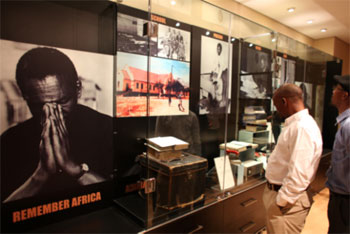Hamilton tackles taboos at the Nelson Mandela Foundation

PHOTOGRAPH COURTESY OF ORYX MULTIMEDIA
Archive and Public Culture's NRF Chair Professor Carolyn Hamilton recently participated in the first in a series of provocative dialogue sessionsto mark ten years since the passing of the Promotion of Access to Information Act. These open sessions are aimed at exploring what access to information and the representation of our history means within the context of the liberation struggle.
On 25 February, an audience of over 130 people, including struggle stalwarts, historians, politicians, dignitaries and members of the public gathered at the Nelson Mandela Foundation in Johannesburg for a day of intense dialogue around the theme, The secret, the taboo and the disavowal: Hidden spaces in South Africa's liberation history.
'Cultures of secrecy are pervasive in South African society, and that understanding this is imperative if we are to engage meaningfully with what is going on in Parliament, the Union Buildings and Luthuli House,' said the Foundation's Verne Harris in his opening address. 'Obviously there are many obstacles to accessing information in our society, ranging from lack of will to lack of resources, from deliberate obstruction to poor record keeping. But what are the dynamics of psychology, culture, organisation and association that resist transparency? Our focus groups have identified three: the secret, the taboo, and the disavowal.'
Hamiltonspoke as part of the second panel, chaired by Frank Meintjiesof the Nelson Mandela Foundation, titled 'the taboo'. She explored homosexuality and trans-sexuality as taboo and recalled the pronouncement by South Africa's former Minister of Arts and Culture Lulu Xingwana that 'homosexuality is not African' in response to artist and activist Zanele Muholi's photographs depicting naked women embracing. Xingwana was reported as saying she walked out of the exhibition in March 2010 'because it expressed the opposite of social cohesion', and because children were present.
'What is the dangerous social disorder that the breeching of a taboo [such as homosexuality] threatens to dissipate? Is it that the lifestyle challenges patriarchy?' asked Hamilton. The solution, she suggested, is that taboos have to be named and recognised. They cannot be suppressed.
'Trans-sexuality has a long history of being taboo, both as a state of being and as a topic of discussion,' she said. 'We have grave difficulties in producing statistics on the numbers of babies born intersexed because the birth paperwork on which the statistics are based offer two options, male or female. In many instances, intersexed births are followed by determining genital surgery.
'The debate around the gender ascription of Caster Semenya hinged on whether s/he is male or female. Interestingly, in that case the taboo on the recognition of the state of transsexuality was breached because of the public controversy. Deeply rued for the pain that the taboo breach caused Semenya, the controversy was also heralded by transsexual activists who found in it an opportunity to speak out in the media about transsexuality.'
Hamiltonspoke alongside editor-in-chief of Avusa and chairperson of the South African National Editors' Forum, Mondli Makhanya, and author Mmatshilo Motsei.
The forum coincided with the launch of the exhibition, Remember Africa: Robert Mangaliso Sobukwe (1924-1978), designed and produced by Oryx Media. Sobukwe was a teacher and political activist who, in 1958, was instrumental in initiating a breakaway from the ANC, resulting in the birth of the Pan Africanist Congress (PAC). He was unanimously elected as the first president of the PAC at its inaugural congress.
Convened by the Nelson Mandela Centre of Memory, the South African History Archive (SAHA) and the Robert Sobukwe Trust, the exhibition was launched on February 24 with keynote addresses by author and academic Jacob Dlamini as well as Sobukwe's son, Dini Sobukwe, chairperson of the Robert Sobukwe Trust.